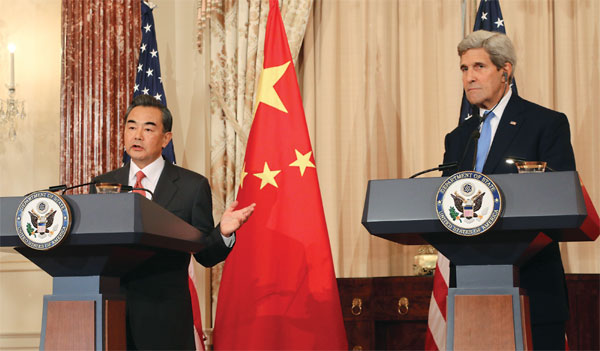China, US voice commitment to ties
Ebola epidemic, fighting terrorism are pivotal areas
US President Barack Obama voiced his commitment to building a stable and constructive US-China relationship, according to a statement on Wednesday from the White House.
Obama made the statement while joining a meeting on Wednesday afternoon between Chinese Foreign Minister Wang Yi and US National Security Advisor Susan Rice in the White House.
|
Chinese Foreign Minister Wang Yi (left) speaks to the press in the Ben Franklin Room of the State Department while US Secretary of State John Kerry looks on during a press briefing on Wednesday after their meeting to discuss a wide range of issues. Chen Weihua / China Daily |
The statement said Obama cited the areas of cooperation on climate change, the Ebola epidemic, and countering the threat posed by terrorists, particularly ISIL.
Obama also affirmed that he is looking forward to his visit to China in November. He is scheduled to attend the APEC summit in Beijing on Nov 10-11 and followed by one-day visit to China on Nov 12.
Wang expressed that he agreed completely with the US side that the two countries should make concerted efforts in maximizing their cooperation and minimizing their differences.
He said the Chinese side welcomes President Obama's visit to China and is willing to work with the US side in deepening mutual strategic trust, expanding mutually beneficial cooperation in all areas and making concrete progress in building a new model of major country relationship between the two countries.
Before meeting Obama, Wang and his US counterpart, Secretary of State John Kerry, both addressed the press at the State Department.
Wang said the two countries need cooperation. "We can cooperate with each other, and there is an increasing list of areas of cooperation between us, and I believe the list can go on," he said.
The 60-year-old career Chinese diplomat arrived in Washington on Tuesday after a three-day visit to Mexico. He was in New York last week for the United Nations General Assembly.
Comparing the bilateral relationship to a giant ship sailing on the sea, Wang said it requires both sides to work jointly to keep the ship on the right course, keep injecting the impetus for it to forge ahead, and at the same time, to work jointly to properly handle hidden rocks and shoals.
Many observers of China-US relations are worried that the competitive factors and differences between the two countries, if handled unwisely, are likely to take over the relationship despite their entwined economic and trade ties and growing people-to-people and military-to-military exchanges.
Disputes and incidents in the past year in areas such as cyber security, military encounter in the sea and tensions in both the South and East China seas have cast a shadow on the relationship.
In his later meeting with Kerry, Wang said the two sides should speed up the negotiation of a Bilateral Investment Treaty to promote two-way investment.He said while China is pushing forward its anti-corruption campaign, it hopes to strengthen cooperation with the US in hunting down those fugitives and recovering their ill-gotten gains.
Many corrupt Chinese officials and business people are believed to be hiding in the US."The United States should not become a safe haven for those corrupt people," Wang told Kerry. The Chinese foreign minister also called to further expand the bilateral military-to-military relationship and push forward the establishment of a notification mechanism of each other's major military activities and a code of conduct for air and sea in the high seas.He also said the two sides should work out more reciprocal preferential visa arrangement to facilitate the people-to-people exchange.
While Kerry expressed his concern over Hong Kong in the ongoing Occupy Central movement, Wang was quick to point out that Hong Kong affairs are China's internal affairs.
"All countries should respect China's sovereignty. And this is also a basic principle governing international relations," he said.
"I believe for any country, for any society, no one will allow those illegal acts that violate public order. That's the situation in the US, and that's the same situation in Hong Kong," said Wang."We believe that the Hong Kong Special Administrative Region's government has the capability to properly handle the current situation in accordance with the law."
Chinese Foreign Ministry spokeswoman Hua Chunying said in Beijing on Tuesday that China urges relevant countries to be prudent in words and deeds, refrain from interfering in Hong Kong's internal affairs in any way, and do not support the illegal activities such as the "Occupy Central" nor send any wrong signal.
Kerry, who had met Wang several times this year, praised China's contribution to the fight against the deadly virus Ebola in West Africa, where China has sent medical personnel, equipment and money.
"We view that in very positive terms with respect to China's important role in global leadership," Kerry said.
He said that is why the two countries are committed in trying to find ways to cooperate on those issues of greatest consequence on a global basis while managing some of their differences effectively.
"We want to show a new model of relations in which we broaden our cooperation on the common interests and constructively manage those differences so that we can be as effective as possible,"
The Chinese Foreign Minister also went to Pentagon on Wednesday afternoon to meet US Defense Secretary Chuck Hagel. He met on Tuesday with former US National Security Advisors Zbigniew Brzezinski and Tom Donilon.
chenweihua@chinadailyusa.com



















